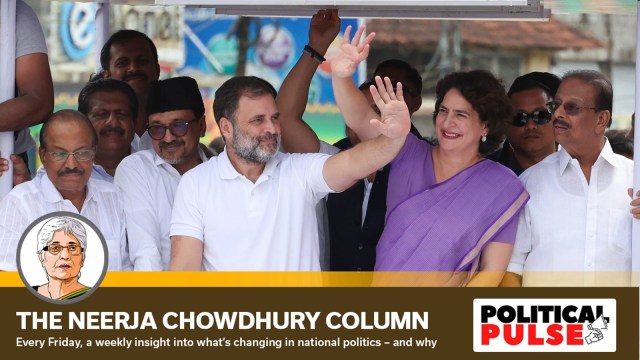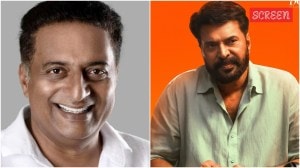As North-South faultlines appear, what Priyanka Gandhi’s Kerala electoral debut will mean
If she wins Wayanad, as is likely, how does she navigate this tricky terrain? With all three Gandhis in Parliament, what message does it send to the party?
 Rahul Gandhi and Priyanka Gandhi Vadra during a roadshow before the latter filed her nomination. (Facebook/ Priyanka Gandhi)
Rahul Gandhi and Priyanka Gandhi Vadra during a roadshow before the latter filed her nomination. (Facebook/ Priyanka Gandhi)After two decades of speculation over when she will take the leap, Priyanka Gandhi Vadra is all set to enter the electoral arena and Parliament, that is if she wins the Wayanad bypoll on November 13.
Given the constituency’s political profile — it has almost 43% Muslims, 13% Christians, around 10% tribals, and 7% Dalits — that is very likely. For long, Wayanad has been one of the Congress’s safest seats and Priyanka got an enthusiastic response when she went to file her nomination papers last week.
Both the Gandhi siblings made an emotional pitch to the people of Wayanad, with Rahul saying that the constituency would now have two MPs all the time, one elected and the other him. The decision for Priyanka to enter parliamentary politics is unlike 2004 when the Gandhi family decided that it would be Rahul, not Priyanka, who would contest the Lok Sabha elections. It was then said that Priyanka’s children were young and needed her around. Had she come into politics in the years that followed, she could have very well become a rival pole in the party. Sonia Gandhi, from all accounts, was clear about who the party leader should be.
Today, Rahul has come into his own and is accepted as the top boss in the party, more confident than he was five years ago when his sister entered active politics. Her role now is likely to be secondary.
During the recent Lok Sabha elections, at one stage it seemed Priyanka might contest from Rae Bareli. It would have been a natural next step for her after years of nursing the seat for her mother. Rahul was anyway contesting from Wayanad and he declared his intention to fight from Rae Bareli only after voting was over in the Kerala constituency.
As things turned out, Rahul now represents a seat in the North and Priyanka may represent one in the South. Their grandmother Indira Gandhi, who Priyanka resembles, had chosen the South over the North several times. In 1980, she gave up Rae Bareli and retained Medak (now in Telangana), when she bounced back to power. In 1977, the South had stood with her when the Congress was wiped out all over the North in the election held after the Emergency. A year later, she began her comeback journey from the lush green, coffee plantation-dotted constituency of Chikmagalur in Karnataka, where she won a bypoll.
I remember the interest Priyanka sparked when she accompanied her mother to Bellary to fight against the BJP’s star performer Sushma Swaraj in 1999. Stopping in Hyderabad on the way back, I was struck by the number of party workers who pitched for Priyanka to join active politics for she “reminds us of Indira amma”. It took the party (or the family) a quarter century to make that decision. As a result, Priyanka is contesting her first election at 52 and Rahul is already a five-time MP. India too has moved on, with 65% of India under 35, and a fading memory of Indira Gandhi’s rule.
Priyanka and North-South tensions
If elected, Priyanka will represent the South at a time when North-South tensions are growing, something reflected in Andhra Pradesh Chief Minister Chandrababu Naidu’s call to people in the South to have more children. There is growing angst in the southern states that the impending delimitation exercise, due in 2026, will work against the South just because it has controlled its population. The northern states, on the other hand, have not done so well. But they stand to gain because their larger populations will increase the number of MPs they send to the Lok Sabha, the exercise contingent on the decadal Census that has been delayed. Delimitation, in short, is a political time bomb ticking away.
How will Priyanka, whose family is accepted by the North and the South alike, navigate this tricky terrain? Becoming an MP from Wayanad, and being who she is, will give her a rare opening to engage with both the North and the South. Will she seize it as an opportunity, which can enable the South to view itself not as a victim but as a powerhouse of new ideas and successful endeavours?
Additionally, how will she ensure that the Congress gets strengthened south of the Vindhya? It is possible that Priyanka is handed charge of a campaign. She was sought as a campaigner by party managers during the Lok Sabha elections. The CMs of Karnataka and Telangana, and the other state units asked for her, given her appeal among women voters who are emerging as an important constituency for every party.
The flip side
There is also a flip side to the Priyanka story. Having three members of the Gandhi family in Parliament at the same time sends its own signal, that the dynastic principle and not democratic functioning that Rahul Gandhi speaks of is strengthening.
It also seals the leadership question in the Congress. With both the siblings in their fifties, they are likely to call the shots at least for another two decades. That being the case, staying on the right side of the family may become even more pronounced in the party as the way to get ahead.
Priyanka is known for thinking on her feet politically and giving it back as good as she gets. In 1999, she asked the people of Rae Bareli if they would vote for Arun Nehru, her father Rajiv’s third cousin and the man who had “betrayed” him. That one-liner was enough to sink Arun Nehru’s attempts to get elected.
Priyanka has also dealt with Narendra Modi’s charge of “parivarwaad (dynasty politics)” head-on, speaking about the “shahadat (martyrdom)” of Indira and Rajiv. It is after all people, she has pointed out, who elect the members of the “family”. It is also equally true that an ordinary Congress worker such as Kishori Lal Sharma, and not a member of the Gandhi family, can defeat Smriti Irani in Amethi when given a chance, a chance he did not get for years despite looking after the constituency for the family.
How will Priyanka’s entry into Parliament affect Rahul’s politics? The siblings will together up the ante against the BJP. The family is also known to take decisions together and not publicly air their differences. But what happens if Priyanka outshines Rahul and this leads to a sharpening of the divide between the two groups loyal to them?
Priyanka’s electoral debut will, therefore, turn a page in the ongoing story of the Indian National Congress, coming as it does when the party has shown signs of revival.
(Neerja Chowdhury, Contributing Editor, The Indian Express, has covered the last 11 Lok Sabha elections. She is the author of How Prime Ministers Decide)



- 01
- 02
- 03
- 04
- 05




























